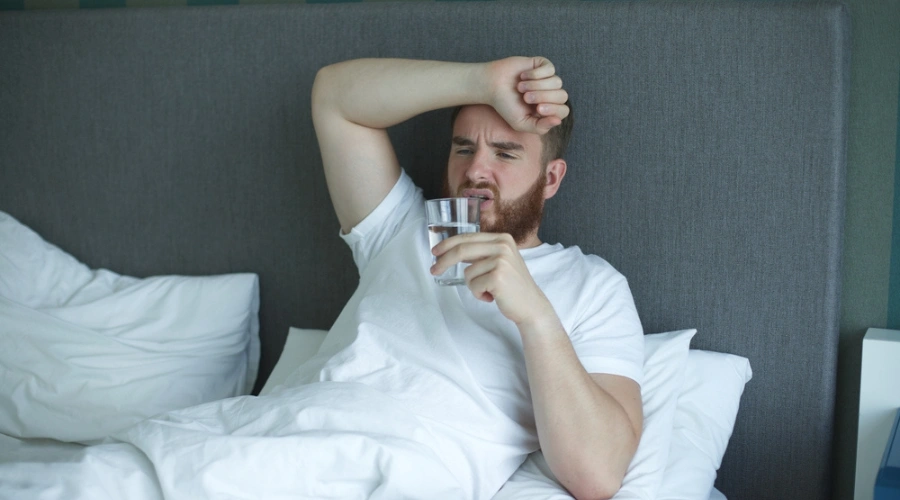Overconsumption of Marijuana and its Lingering Effects
With marijuana being more socially accepted than other substances, it’s not uncommon to see a joint, bong, bowl, or even edibles being passed around at a party or get-togethers with friends.
If you aren’t an experienced smoker though, or if you consume much more than you normally would, there’s a risk of experiencing hangover symptoms – similar to what people experience when overindulging in alcohol.
But, how long does a weed hangover last? And what exactly does it feel like?
A cannabis hangover can be an unpleasant experience, accompanied by mild nausea, brain fog, and other symptoms. However, it usually does not last longer than 24 hours and there are things that you can do to support your body through the process. Keep reading to learn more about what to expect and when to reach out to Catalina for additional support.
Get Effective Detox and Rehab Options at Catalina
What is a Weed Hangover?
A marijuana hangover is most likely to happen when you consume an excessive amount of marijuana, particularly if you do not have a tolerance to cannabis. You might feel fatigued, nauseous, or have other mental or physical symptoms the next day.
Weed hangovers are more common when consuming an excessive amount of edibles, compared to smoking marijuana. However, it can happen any time that you go too far beyond your body’s natural tolerance for cannabis use.
Mixing weed use with alcohol or other drugs, failing to be hydrated or eat a balanced diet, and not sleeping enough can also contribute to the after-effects you feel from a weed hangover.
Weed Hangover Symptoms

While the medical community doesn’t have an official position on hangovers from excessive marijuana consumption, some of the common symptoms you might feel after overdoing it include:
- Persistent headache
- Nausea or upset stomach
- Restlessness
- Nightmares or other sleep disturbances
- Brain fog or lack of mental clarity
- Troubles concentrating
- Dry mouth or dehydration
The onset of symptoms from a weed hangover depends on whether you were smoking weed or consuming cannabis edibles. Smoking cannabis has a faster onset and fades faster, with effects starting soon after smoking and lasting about 30 minutes to an hour. The effects of edibles can last 4-6 hours or longer.
In high doses, in particular when experiencing a ‘green out,’ it’s very possible to feel the effects of marijuana the next day. Often, you’ll feel a weed hangover after sleeping, when you wake up the morning after consuming or smoking marijuana. Fortunately, these symptoms usually last around 8-24 hours before subsiding.
Are Weed Hangovers as Intense as Alcohol Hangovers?
The hangover effects from consuming weed are much less intense than the symptoms of alcohol hangovers. However, they can still be incredibly uncomfortable. Symptoms can also be worse after using cannabis edibles, rather than smoking weed.
However, both edibles and smoking cannabis have the potential to cause a weed hangover, ranging from physical symptoms like dry mouth to behavioral effects.
Factors That Affect the Intensity of Weed Hangover Symptoms
The onset, length, and symptoms of a marijuana hangover depend on factors like marijuana smoking habits, the cannabis strains consumed, THC content, consumption method, and overall physical health. Whether a person takes other substances or drinks alcohol with weed use also increases the risk of a hangover.
How to Manage a Weed Hangover

The best way to manage a weed hangover is to support your body with proper hydration and nutrition, rest when possible, engage in light physical activity, and try natural remedies or over-the-counter medications to reduce residual effects during the recovery process. Here are a few strategies to try.
Supporting Your Body with Hydration and Nutrition
Eating a balanced meal and drinking plenty of water can make all the difference in supporting your body through a weed hangover. Nutrient-dense foods will replenish nutrients, stabilize blood sugar levels, and provide energy.
Drinking plenty of water is also important, particularly because marijuana causes dry mouth and dehydration. Electrolyte-rich beverages can also help reverse the diuretic and dehydrating effects of cannabis products.
Rest and Relaxation
Getting adequate rest when recovering from marijuana use can help relieve some cannabis-related negative consequences like brain fog while you wait out the symptoms of a cannabis hangover. If you are struggling with insomnia or feel restless, try relaxing activities like taking a bath or shower with hot water, deep breathing, calm music, or meditation.
Light Physical Activity
Being physically active might seem like the last thing you want to do when recovering from excessive cannabis consumption. However, yoga, stretching, or a short walk can help pump blood through your body and chase away mental fog and boost energy levels. It also produces endorphins, which are beneficial for your mood.
Get Accredited Treatment Programs at Catalina
Can Medication Fix a Cannabis Hangover?
You can take an over-the-counter medication like ibuprofen for body aches or Tylenol for headaches. However, you should take these medications as prescribed or indicated on the label if OTC. If you are worried about medication interactions, be sure to consult with your healthcare provider.
Try Some Tea
Ginger tea can improve symptoms by easing acute effects of nausea commonly associated with a weed hangover. Some people also enjoy green tea to relieve symptoms, which has minimal caffeine and antioxidants that can give you a mental boost and fight brain fog.
While green tea has a small amount of caffeine, you should avoid caffeine from coffee or energy drinks while recovering from a weed hangover. While it might help combat fatigue, excess caffeine can worsen symptoms like anxiety or mood disturbances while also stopping you from getting extra sleep. Excess caffeine also has diuretic effects that inhibit you from staying hydrated.
Preventing Weed Hangovers

The only way to 100% avoid adverse symptoms from cannabis consumption is to avoid using weed in the first place. If you are going to use, it, however, it is possible to improve your cannabis experience and reduce the risk of after effects by having a nutritious breakfast that day and staying hydrated.
Being informed about what are using is also important. The strain of cannabis, its potency, and whether it comes from a reputable source all effect the chances of a cannabis hangover.
What if I Have a Hard Time Abstaining from Marijuana?
If you are struggling to quit using cannabis, you are not alone. According to statistics from Yale, approximately 10% of marijuana users have cannabis use disorder, while an additional 30% meet criteria for addiction.
It is possible to use marijuana occasionally, but for people struggling with stress, chronic pain or other conditions, or mental health disorders, its easy for this innocent use to become a habit. Marijuana is also a popular, easy-to-access drug. This can make it hard to quit, especially if a lot of your friends are cannabis users.
With marijuana being legalized for recreational and/or medical use in so many states, it is readily available. This can make it hard to quit, particularly if your social circle is heavy cannabis users. Look to the following treatment options for help.
Treatment Options for Marijuana Use and Abuse

In times like these, turn to the medical professionals at Catalina Behavioral Health for help. Often, cannabis addiction can be treated in an outpatient setting, such as an intensive outpatient or partial hospitalization program.
These programs occur in sessions on different days of the week. Each session is several hours long and adjusted to your specific needs including treatment intensity and schedule. Unlike residential programs, you’ll return home after treatment. This makes it easy to go to work, spend time with your family, and tend to responsibilities.
Catalina does provide marijuana detox for heavy users who have become dependent on cannabis products for daily life, as part of our overall, evidence-based and accredited marijuana rehab offerings.
We also offer dual diagnosis across all our treatment programs. Dual diagnosis is beneficial for people struggling with co-occurring mental health and cannabis use disorders. It benefits people struggling with depression, anxiety, or unresolved trauma that contributed to marijuana use.
Up To 100% of Rehab Costs Covered By Insurance
Reach Out to Catalina to Discuss Treatment Options Today
Consuming cannabis often starts innocently. However, as you start to rely on it for stress relief, as a pain reliever, and to promote relaxation, it’s easy to fall into a habit. While it is not considered as physically addictive as other drugs, it is still possible to develop a dependence on marijuana with prolonged use.
Despite its legalization in several states, weed isn’t always used responsibly. It can have negative effects on your life, including weed hangovers, mental and physical health effects, relationship problems, employment issues, financial problems, and trouble with the law.
If you want help overcoming the adverse effects of over-indulging in cannabis, reach out to Catalina for a confidential discussion of support options today.
We can also discuss our individualized treatment programs, verify your insurance, and answer any questions you might have.
References
- https://www.yalemedicine.org/conditions/marijuana-use-disorder
- https://www.health.harvard.edu/staying-healthy/exercising-to-relax





